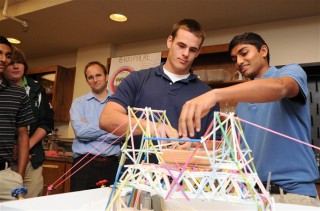The “button and zipping assistive device” (BAZAD), meant to make it easier for people with severe arthritis to perform daily tasks – recently won the top prize at the Quality of Life Technology (QoLT) Pittsburgh Virtual Engineering Design Competition. The competition is funded by The National Science Foundation and brings engineering design into high school science classrooms to engage students in designing solutions that improve the quality of life for citizens with disabilities. QoLT has hosted Ellis student interns since 2012, providing our girls with access to complex, real-world, hands-on experience in design thinking methods.
Ellis engineering teachers Cara Laroche and Sam Rauhala have participated in a Research Experience for Teachers since last spring to develop the unit where the girls designed their device. Along with Dr. Bambi Brewer and Dr. Lisa Abel-Palmieri, co-teachers of the course, Ellis faculty mentored small teams of 3 to 4 students as they defined problems people with disabilities face, gained empathy for people facing these disabilities through personal stories and research, and then designed multiple iterations of designs within Autodesk Inventor, the Ellis 3D printer, and manual use of tools to make prototypes. The teams then printed final parts on the 3D printer and presented them to the class and an internal panel at Ellis. The BAZAD was the top design out of the four teams at Ellis. Students across all schools used SWORD Peer Review, a project out of the University of Pittsburgh LRDC, to evaluate each other’s work. The goal of the Virtual Design Competition is to showcase students’ designs and reward innovation and effort. Four teams of Ellis students, each mentored by a faculty member, created entries that included the “RecFin,” an assistive swimming device for people with a limb loss below the knee, the “Triple Threat,” an assistive hair-tying device and the “Hold Tight,” a device to help grip small objects.

